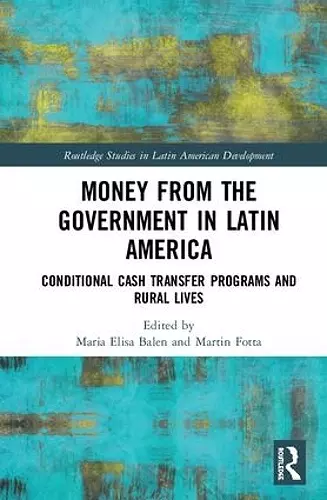Money from the Government in Latin America
Conditional Cash Transfer Programs and Rural Lives
Martin Fotta editor Maria Elisa Balen editor
Format:Hardback
Publisher:Taylor & Francis Inc
Published:19th Nov '18
Currently unavailable, and unfortunately no date known when it will be back
This hardback is available in another edition too:
- Paperback£40.99(9781032178509)

It has been almost two decades since conditional cash transfer programs first appeared on the agendas of multilateral agencies and politicians. Latin America has often been used as a testing ground for these programs, which consist of transfers of money to subsections of the population upon meeting certain conditions, such as sending their children to school or having them vaccinated. Money from the Government in Latin America takes a comparative view of the effects of this regular transfer of money, which comes with obligations, on rural communities.
Drawing on a variety of data, taken from different disciplinary perspectives, these chapters help to build an understanding of the place of conditional cash transfer programsin rural families and households, in individuals’ aspirations and visions, in communities’ relationships to urban areas, and in the overall character of these rural societies.
With case studies from Chile, Mexico, Peru, Brazil and Colombia, this book will interest scholars and researchers of Latin American anthropology, sociology, development, economics and politics.
"This urgently-needed volume reveals the power of a technically savvy, yet conceptually sophisticated, anthropology to confront the social policy question of our time: Do the conditional cash transfers (CCTs) represent the ideal paradigm for fighting social injustice in the twenty-first century? Both critical and even-handed, these chapters reveal the faulty premises and unintended consequences of such policies and open new vistas for progressive state action." -- Aaron Ansell, Assistant professor of Anthropology, Virginia Tech, USA, author of Zero Hunger: Political Culture and Anti-poverty Policy in Northeast Brazil, University of North Carolina Press
"Cash transfers are widely accepted as effective palliatives in efforts to alleviate extreme poverty. But we know little about their impact on the individuals, households and communities that they serve. Fotta and Balen have assembled a rich collection of ethnographic case studies which analyse the micro-social dynamics of these programmes, revealing their effects on class, gender and ethnic relations. The editors provide fresh critical perspectives on the cash transfer phenomenon, challenging scholars and policymakers to think carefully when weighing up the positives and negatives of these programmes. This is not only a most welcome contribution to the debate on social protection but shows how essential social analysis is for the domain of public policy." -- Maxine Molyneux, Professor of Sociology, University College London, UK, editor of The Social and Political Potential of Cash Transfers, Routledge
"Written by a select team of specialists from several disciplines, and [deploying] a comparative perspective, the book highlights the diverse meanings that money from conditional cash transfer policies assumes in rural communities across Latin America, and is thus fundamental reading for academics, students, and policy makers." -- André Pires, Professor of Anthropology, Pontifical Catholic University of Campinas, Brazil, author of Ruralidades em Transformação: Agricultores, Caseiros e Moradores de Condomínio, Annablume
ISBN: 9780815387374
Dimensions: unknown
Weight: 453g
212 pages